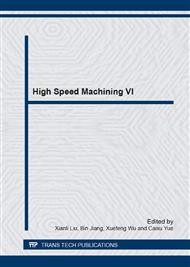p.285
p.290
p.296
p.300
p.305
p.311
p.316
p.321
p.327
Finite Element Simulation and Experiment on Residual Stress in Turing 45# Steel with Complex Groove Tools
Abstract:
The research focused on the finite element simulation of the surface residual stress and took an experiment to get cutting temperature and cutting force by changing different groove and coated tools. Then it analyzed the influence of cutting and tool parameters on cutting force and temperature. Finally, the results reached a conclusion about the way that the tools with different groove and coating influenced the residual stress. The coated tools reduced the residual tensile stress in the machined surface. The axial and tangential residual stress was tensile stress and the tangential residual stress was larger than the axial in machining.
Info:
Periodical:
Pages:
305-310
Citation:
Online since:
July 2014
Authors:
Keywords:
Price:
Сopyright:
© 2014 Trans Tech Publications Ltd. All Rights Reserved
Share:
Citation:


